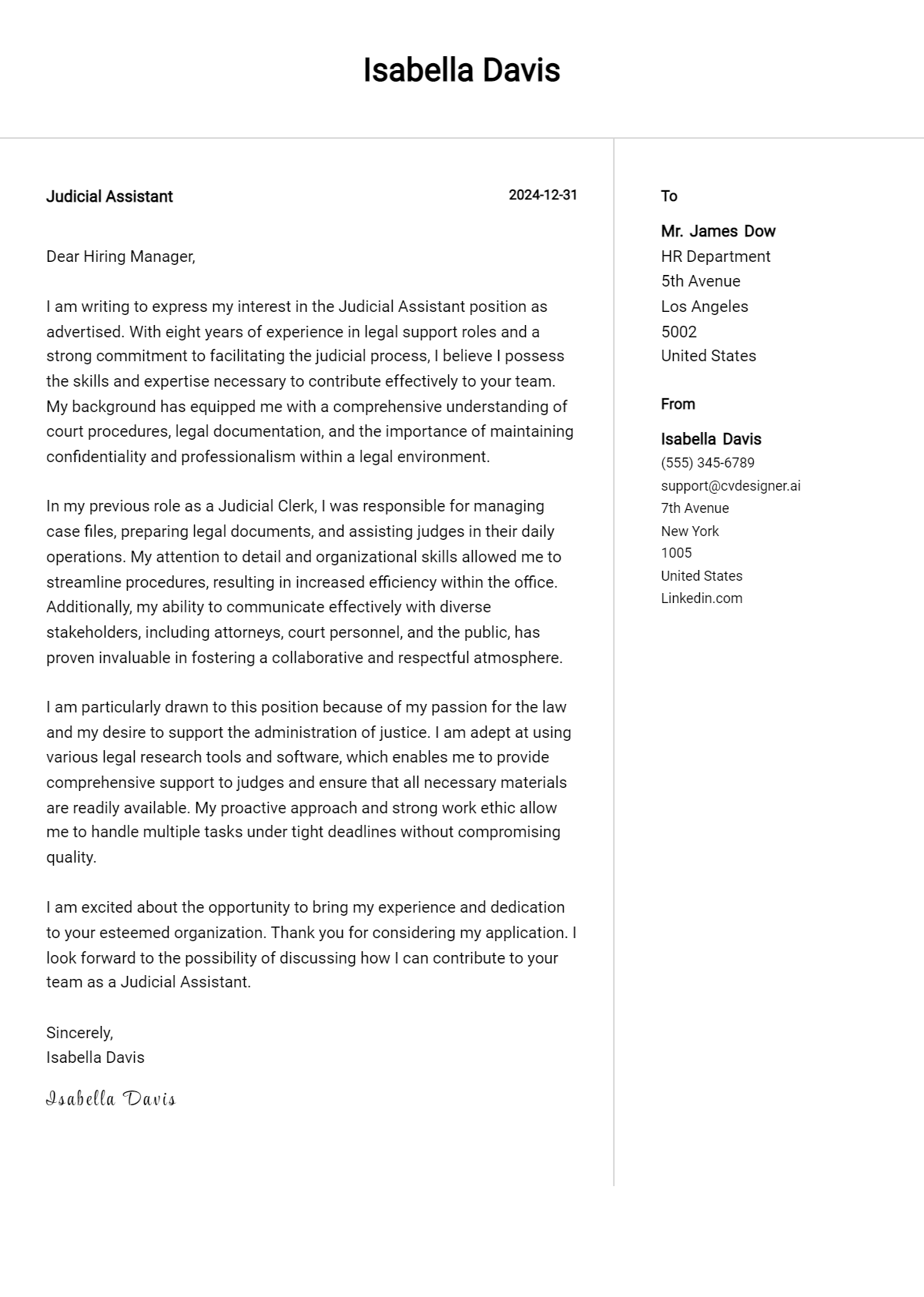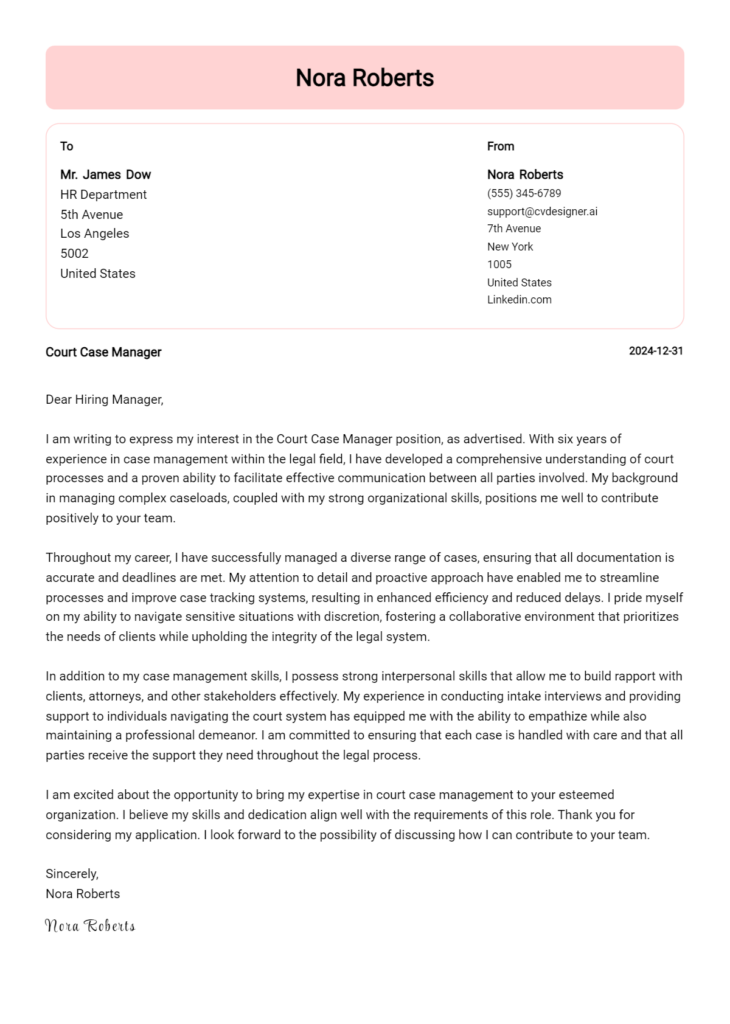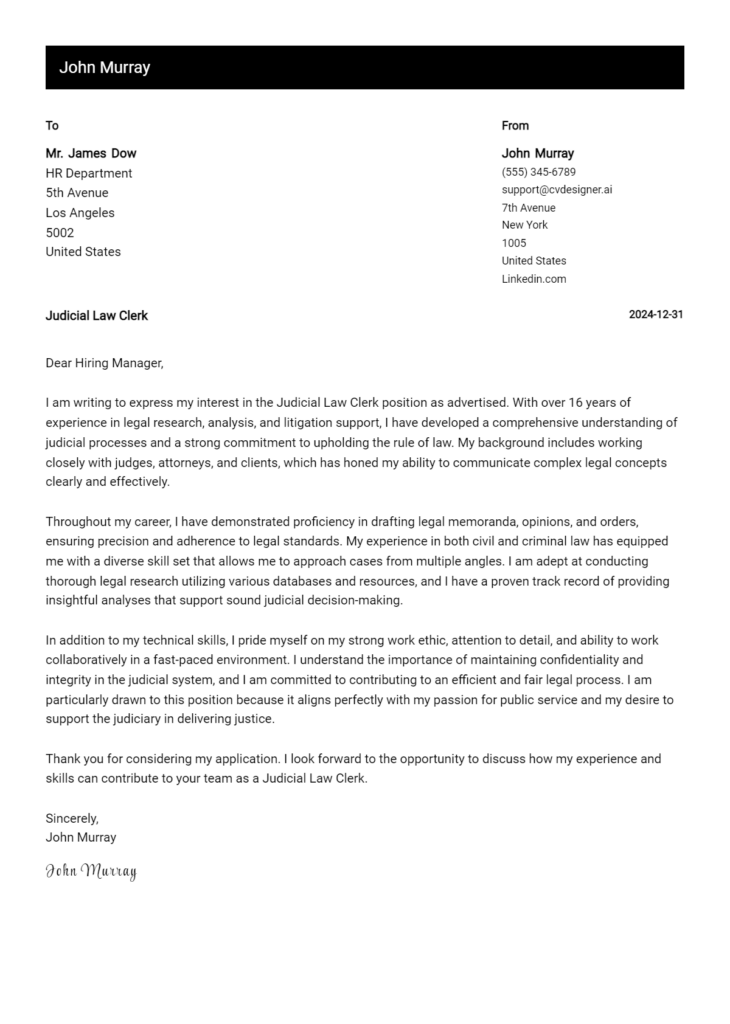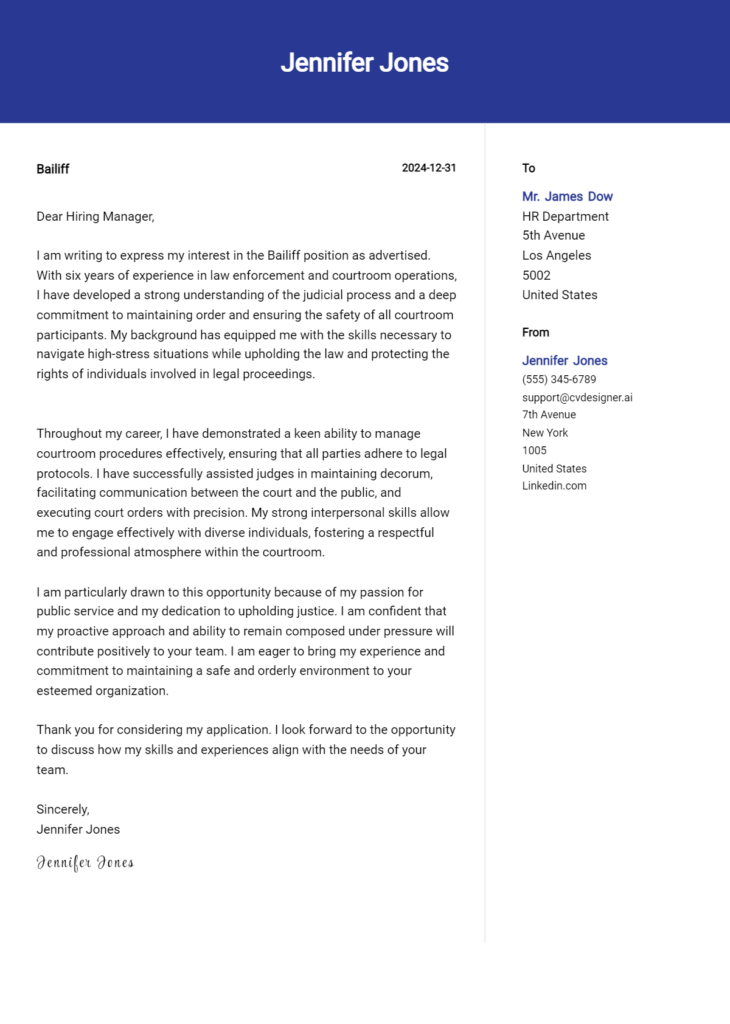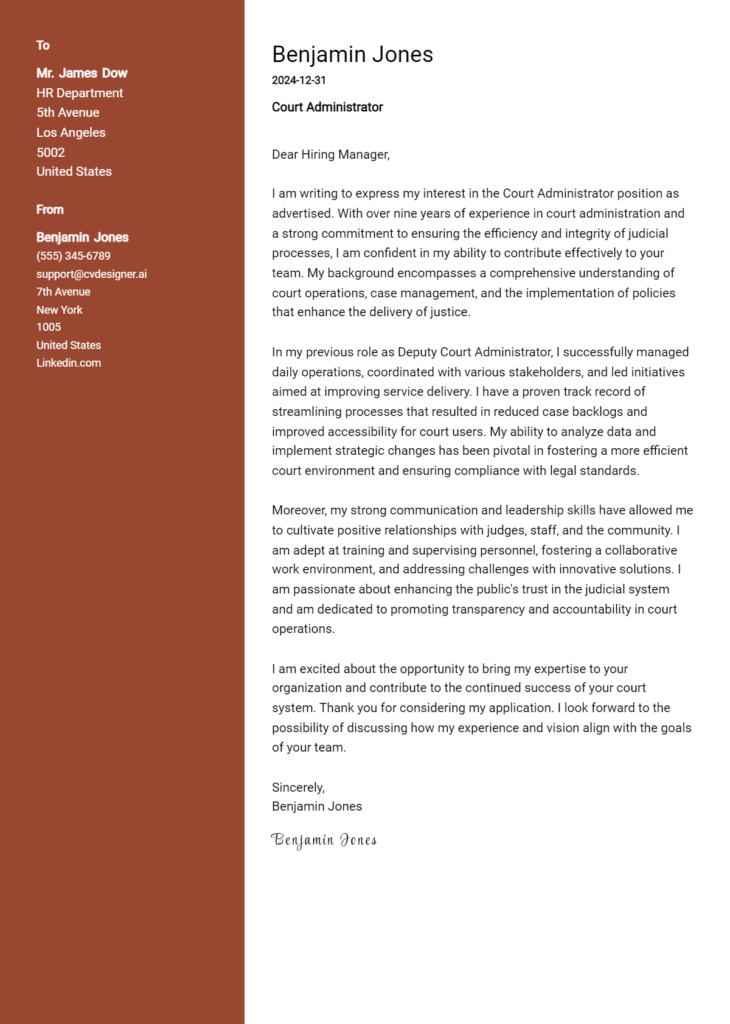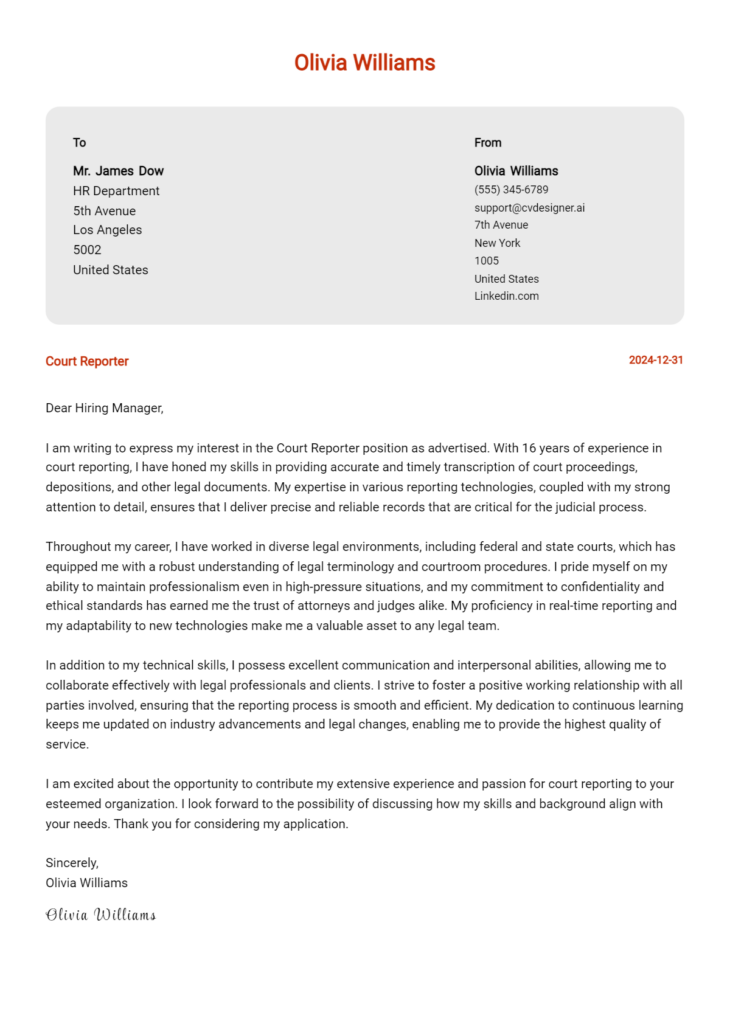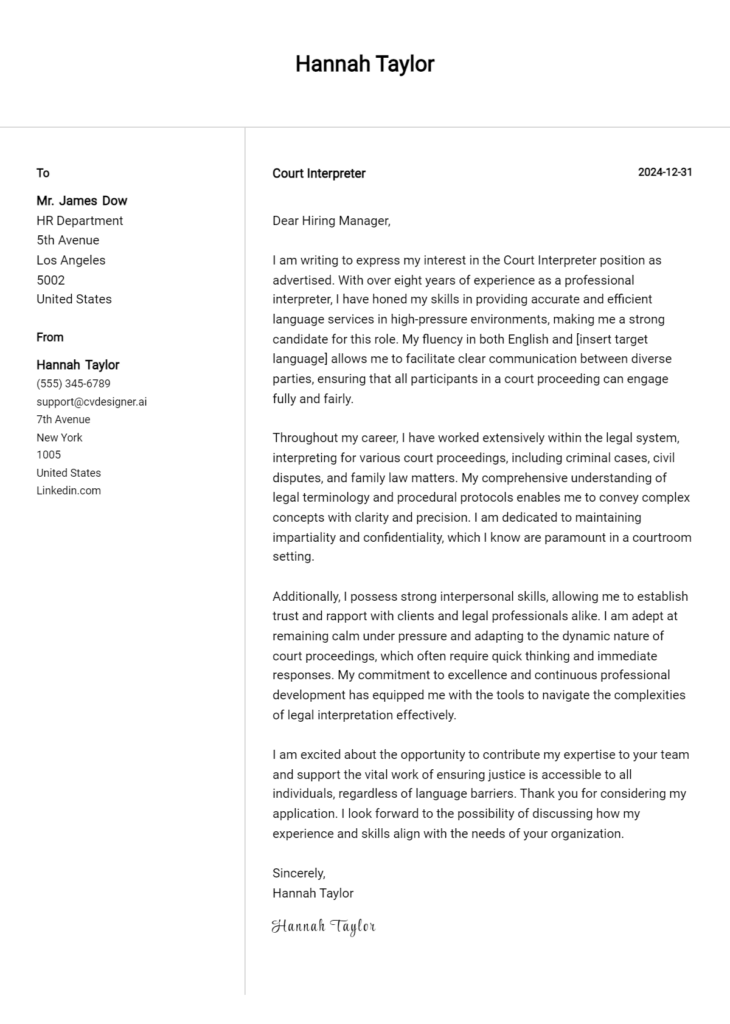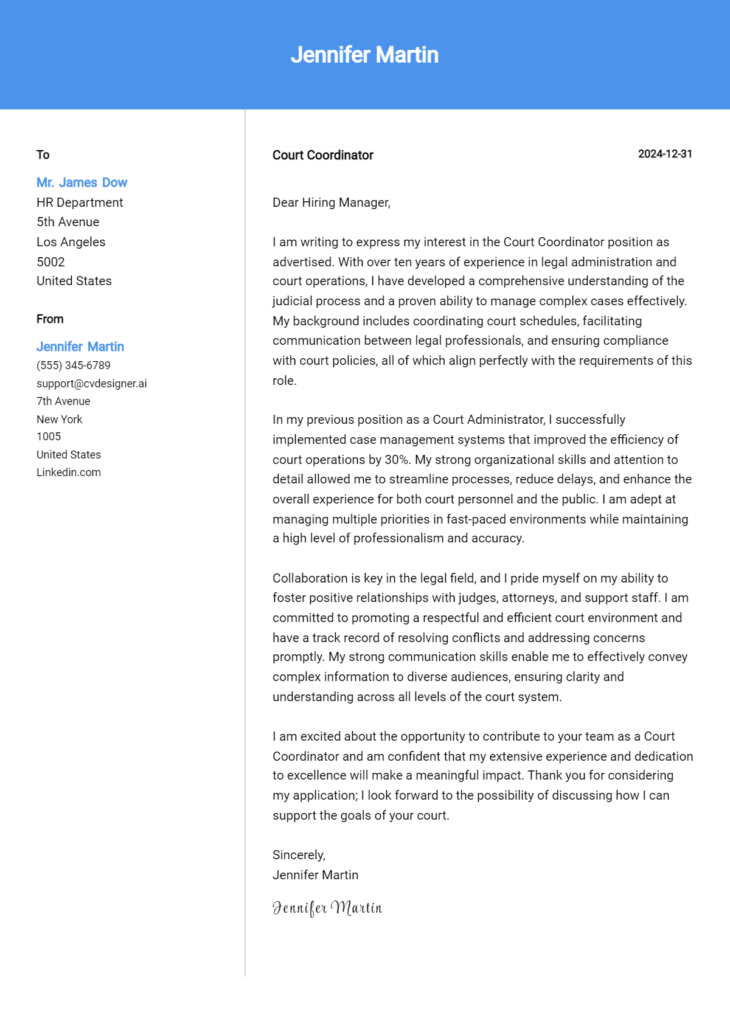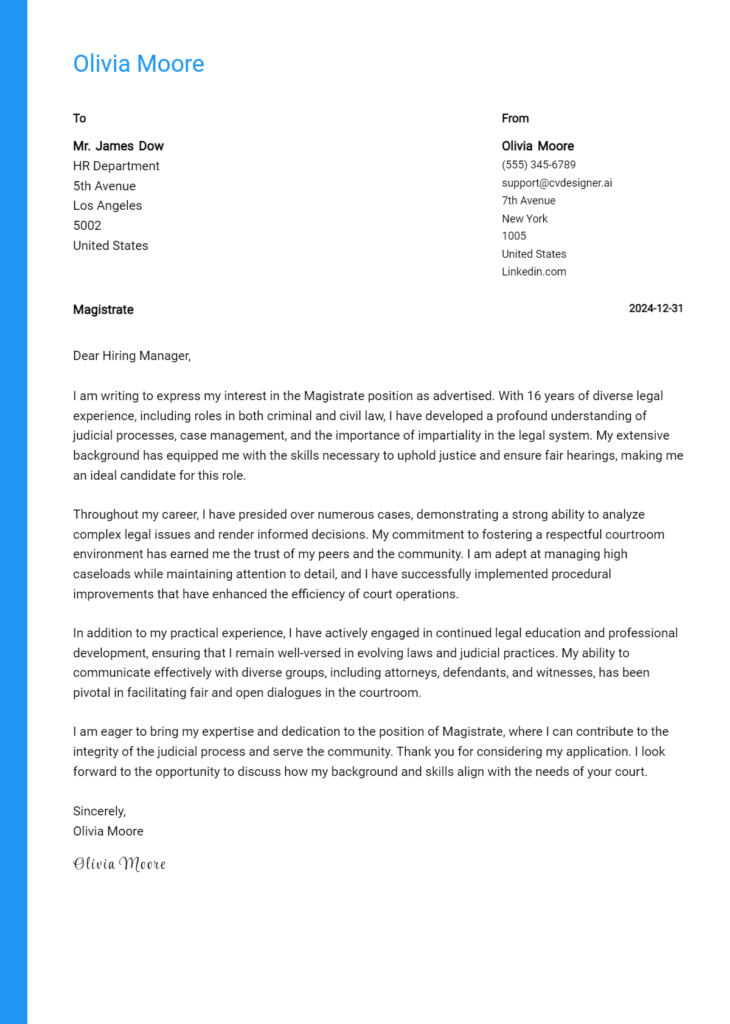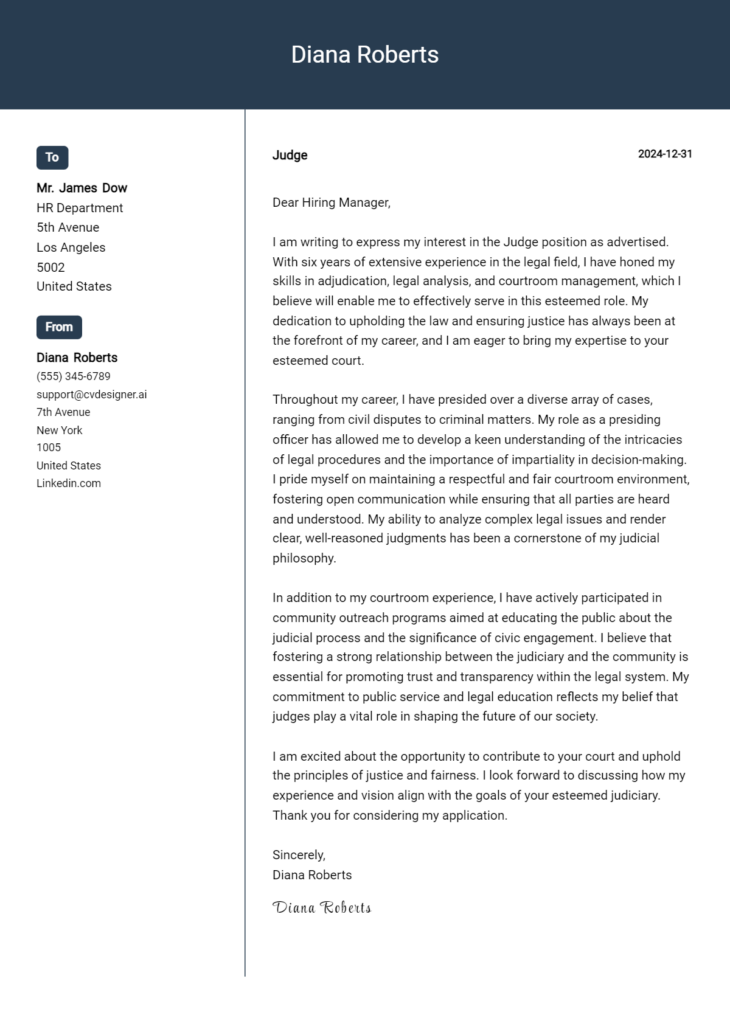Judicial Assistant Cover Letter Examples
Explore additional Judicial Assistant cover letter samples and guides and see what works for your level of experience or role.
How to Format a Judicial Assistant Cover Letter?
Crafting a standout cover letter is essential for a Judicial Assistant, as it serves not only as a reflection of your qualifications but also as a testament to your organizational skills and attention to detail. The way you format your cover letter can significantly influence how hiring managers perceive your professionalism and suitability for the role. A well-structured cover letter captures attention and clearly communicates your capabilities, which are critical attributes in the judicial environment.
In this guide, we'll explore the key components of a professional cover letter, providing insights and examples tailored for the Judicial Assistant position, including:
- Cover Letter Header
- Cover Letter Greeting
- Cover Letter Introduction
- Cover Letter Body
- Cover Letter Closing
Each section is crucial for presenting your qualifications effectively and demonstrating your commitment to the judicial field. Let’s delve into each part to help you create a compelling cover letter that stands out.
Importance of the Cover Letter Header for a Judicial Assistant
The cover letter header is a critical component of any job application, particularly for a Judicial Assistant position. It sets the tone for the entire letter and conveys professionalism and attention to detail—qualities essential in the legal field. A well-structured header should include your contact information, the date, and the recipient's details. This clarity ensures that your application is easily identifiable and accessible to the hiring committee. A strong header reflects your commitment to professionalism, while a weak header can create a negative first impression.
Strong Example:
John Doe 123 Main Street City, State, ZIP john.doe@email.com (123) 456-7890 October 1, 2023 The Honorable Jane Smith Circuit Court of Example County 456 Court Ave City, State, ZIP
Weak Example:
JD Email: johnny123@email.com 10/1/2023 To Whom It May Concern
The Importance of a Tailored Cover Letter Greeting
The greeting of your cover letter serves as the first impression to the hiring manager, setting the tone for the entire document. A well-crafted greeting demonstrates professionalism and personalization, immediately establishing a connection with the reader. By addressing the hiring manager directly, you show that you have taken the time to research and are genuinely interested in the position. Avoiding generic greetings like "To Whom It May Concern" or "Dear Sir/Madam" is essential, as these can come across as impersonal and uninspired. Instead, take the time to find the recipient's name through the company website, LinkedIn, or by calling the office if necessary. This small effort can significantly enhance your cover letter's impact.
Strong Greeting Example
Dear Ms. Johnson,
Weak Greeting Example
To Whom It May Concern,
The Importance of a Strong Cover Letter Introduction for a Judicial Assistant
A well-crafted cover letter introduction is crucial for a Judicial Assistant position as it serves as the first impression of the candidate to the hiring manager. This introduction should not only capture attention but also convey genuine interest in the role. It should succinctly highlight relevant skills or achievements that align with the job description, setting the tone for the rest of the cover letter. A compelling introduction can distinguish a candidate from the competition, making it essential to get it right. Below are examples of both strong and weak cover letter introductions for a Judicial Assistant role.
Strong Example
Dear [Hiring Manager's Name], I am excited to apply for the Judicial Assistant position at [Court Name], as advertised on [Job Board/Company Website]. With over three years of experience supporting legal professionals in a fast-paced environment and a comprehensive understanding of court procedures, I am well-prepared to contribute effectively to your team. My proven ability to manage case files, draft legal documents, and maintain a high level of organization has consistently resulted in improved efficiency and timely case resolution.
Weak Example
To Whom It May Concern, I am writing to apply for the Judicial Assistant job. I think I would be good at it because I have some experience in legal work. I have done a few things like filing papers and answering phones in an office before. I hope you consider my application.
Purpose of the Cover Letter Body for a Judicial Assistant
The body of a cover letter for a Judicial Assistant serves as a critical opportunity to articulate the candidate's relevant skills, experiences, and the unique value they bring to the judicial system. This section should effectively showcase specific projects or accomplishments that demonstrate the applicant's ability to manage case files, conduct legal research, and support judges in their decision-making processes. By providing concrete examples of past work, such as successfully assisting in a high-profile case or implementing a new filing system that improved efficiency, candidates can illustrate their qualifications and commitment to enhancing the judicial process.
Strong Example
In my previous role as a legal intern at Smith & Associates, I successfully managed a caseload of over 50 clients, ensuring timely filing of documents and thorough preparation for court appearances. One of my most significant achievements was assisting in the research for a landmark case that resulted in a favorable ruling for our client. My meticulous attention to detail and organizational skills not only streamlined our case management processes but also earned me a commendation from my supervising attorney. I am eager to bring my strong work ethic and dedication to the Judicial Assistant position, ensuring that the court operates efficiently and justly.
Weak Example
I have worked in several legal offices and have experience in typing and filing documents. I believe I would be a good fit for the Judicial Assistant role because I am organized and can follow instructions. I am looking for a job where I can help people and learn more about the legal system.
Importance of the Cover Letter Closing for a Judicial Assistant
The closing paragraph of a cover letter is critical for a Judicial Assistant position as it encapsulates key qualifications, reiterates enthusiasm for the role, and prompts the hiring manager to take the next steps. A strong closing leaves a lasting impression and encourages further engagement, while a weak closing may fail to convey the candidate's genuine interest or suitability.
Strong Example
Thank you for considering my application for the Judicial Assistant position. I am eager to bring my extensive experience in legal research and case management to your esteemed court. I am confident that my skills align well with the requirements of the role. I look forward to the opportunity to discuss my qualifications further and explore how I can contribute to your team. Please feel free to review my attached resume, and I hope to hear from you soon to schedule an interview.
Weak Example
Thanks for reading my cover letter. I think I would be okay at this job. You can look at my resume if you want. Let me know if you want to talk.
Crafting an effective cover letter for a Judicial Assistant position is crucial for making a strong first impression on potential employers. This document serves not only to showcase your qualifications but also to convey your passion for the legal field and your commitment to supporting the judiciary. By highlighting your technical skills, problem-solving abilities, understanding of the Software Development Life Cycle (SDLC), teamwork, and eagerness for continuous learning, you can create a compelling narrative that sets you apart from other candidates. Here are some tips to help you write an impactful cover letter:
Tips for Writing a Judicial Assistant Cover Letter
Highlight Technical Skills: Clearly articulate your technical proficiencies, especially in legal research tools, case management software, and document preparation. Mention specific programs you are familiar with and how they contribute to efficient legal processes. If you have experience with databases or electronic filing systems, be sure to include those details.
Demonstrate Problem-Solving Abilities: Provide examples of challenges you have faced in previous roles and how you successfully navigated them. Whether it was streamlining a workflow or resolving a conflict, showcasing your problem-solving skills will demonstrate your value as a Judicial Assistant.
Showcase SDLC Knowledge: If applicable, discuss your understanding of the Software Development Life Cycle, especially if you have experience working with legal tech tools. Explain how your knowledge can benefit the court's operations or improve processes, which shows your ability to contribute to the overall efficiency of the judiciary.
Emphasize Teamwork: Judicial Assistants often work closely with judges, lawyers, and support staff. Illustrate your ability to collaborate effectively within a team by providing examples of successful projects or initiatives where you played a key role. Highlight your communication skills and adaptability in working with diverse personalities.
Express a Passion for Continuous Learning: The legal field is constantly evolving, and demonstrating a commitment to lifelong learning is essential. Mention any relevant courses, workshops, or certifications you have pursued, and express your enthusiasm for keeping abreast of legal developments. This will show your dedication to professional growth and your desire to contribute positively to the judiciary.
Utilizing tools like cover letter templates and a cover letter builder can further enhance your writing process, ensuring your cover letter is professional and tailored to the Judicial Assistant role.
Common Mistakes to Avoid in a Judicial Assistant Cover Letter
Avoiding common mistakes in a cover letter is crucial for standing out in the competitive field of judicial assistance. A well-crafted cover letter can be your first impression, and making errors can undermine your qualifications. Here are some common mistakes to be aware of and tips to avoid them:
Generic Language: Using a one-size-fits-all approach can make your cover letter feel impersonal. Tailor your letter to the specific court or judge by mentioning their work or values.
Ignoring the Format: A poorly formatted cover letter can detract from your message. Follow a clear cover letter format that includes a professional header, an introduction, body paragraphs, and a closing statement.
Spelling and Grammar Errors: Typos can create a negative impression. Always proofread your letter multiple times and consider using tools like spell check to catch errors.
Rehashing Your Resume: Your cover letter should complement your resume, not repeat it. Focus on specific experiences and skills that demonstrate your suitability for the role of a Judicial Assistant.
Lack of Specific Examples: Failing to provide concrete examples of your skills and accomplishments can weaken your application. Use specific instances from your past work to illustrate your abilities.
Neglecting the Closing: A weak or absent closing can leave the reader with an unclear impression of your interest. End with a strong statement expressing your enthusiasm for the position and a call to action.
Overly Formal or Casual Tone: Striking the right tone is essential. Aim for a professional yet approachable tone that reflects your personality while maintaining respect for the judicial environment.
For inspiration, check out various cover letter examples that can guide you in crafting your own. By avoiding these common mistakes, you’ll increase your chances of making a positive impression.
Cover Letter FAQs for Judicial Assistant
What should I include in my cover letter for a Judicial Assistant position?
In your cover letter for a Judicial Assistant position, you should include specific details that highlight your relevant skills and experiences. Start with a strong opening that states your interest in the position and the court you are applying to. Clearly outline your educational background, particularly any degrees in law or related fields. Emphasize your organizational skills, attention to detail, and ability to manage multiple tasks, as these are crucial for the role. Additionally, mention any previous experience in legal settings, such as internships or clerkships, and your proficiency with legal research tools and administrative software. Conclude with a strong closing statement that reiterates your enthusiasm for the role and your desire to contribute to the judiciary.
How can I demonstrate my legal knowledge in my cover letter?
To demonstrate your legal knowledge in your cover letter, incorporate specific legal terms and concepts that are relevant to the position of a Judicial Assistant. Discuss any coursework or certifications that showcase your understanding of legal procedures, court systems, or case law. If you have experience with legal research, mention the databases or resources you are familiar with, such as Westlaw or LexisNexis. You could also reference any particular areas of law that you are passionate about or have specialized in, such as criminal law or family law. Providing examples of how you have applied your legal knowledge in previous positions, such as drafting documents or summarizing case files, will further illustrate your qualifications for the role.
How long should my cover letter be?
Your cover letter for a Judicial Assistant position should ideally be one page long, consisting of three to four paragraphs. This length allows you to succinctly present your qualifications and interest without overwhelming the reader. Aim for approximately 300 to 400 words to ensure you cover essential points without being overly verbose. Each paragraph should have a clear focus: the introduction should state your purpose and enthusiasm, the body paragraphs should highlight your skills, experiences, and relevant knowledge, and the conclusion should reiterate your interest and invite further discussion. Keeping it concise and focused will make your cover letter more impactful and easier for hiring managers to read.
Should I customize my cover letter for each application?
Yes, you should absolutely customize your cover letter for each application you submit for a Judicial Assistant position. Tailoring your cover letter allows you to address the specific needs of the court and the unique aspects of the job description. Start by researching the court’s mission, values, and any notable cases or initiatives they are involved in. Incorporate this knowledge by aligning your skills and experiences with the court’s objectives. Use keywords from the job posting to demonstrate that you are a good fit for the role. Additionally, mentioning any connections or experiences related to the specific court can help you stand out. Customization shows your genuine interest in the position and reflects your professionalism and attention to detail, both of which are essential qualities for a Judicial Assistant.
Build your Cover Letter in minutes
Use an AI-powered cover letter builder and have your letter done in 5 minutes. Just select your template and our software will guide you through the process.

